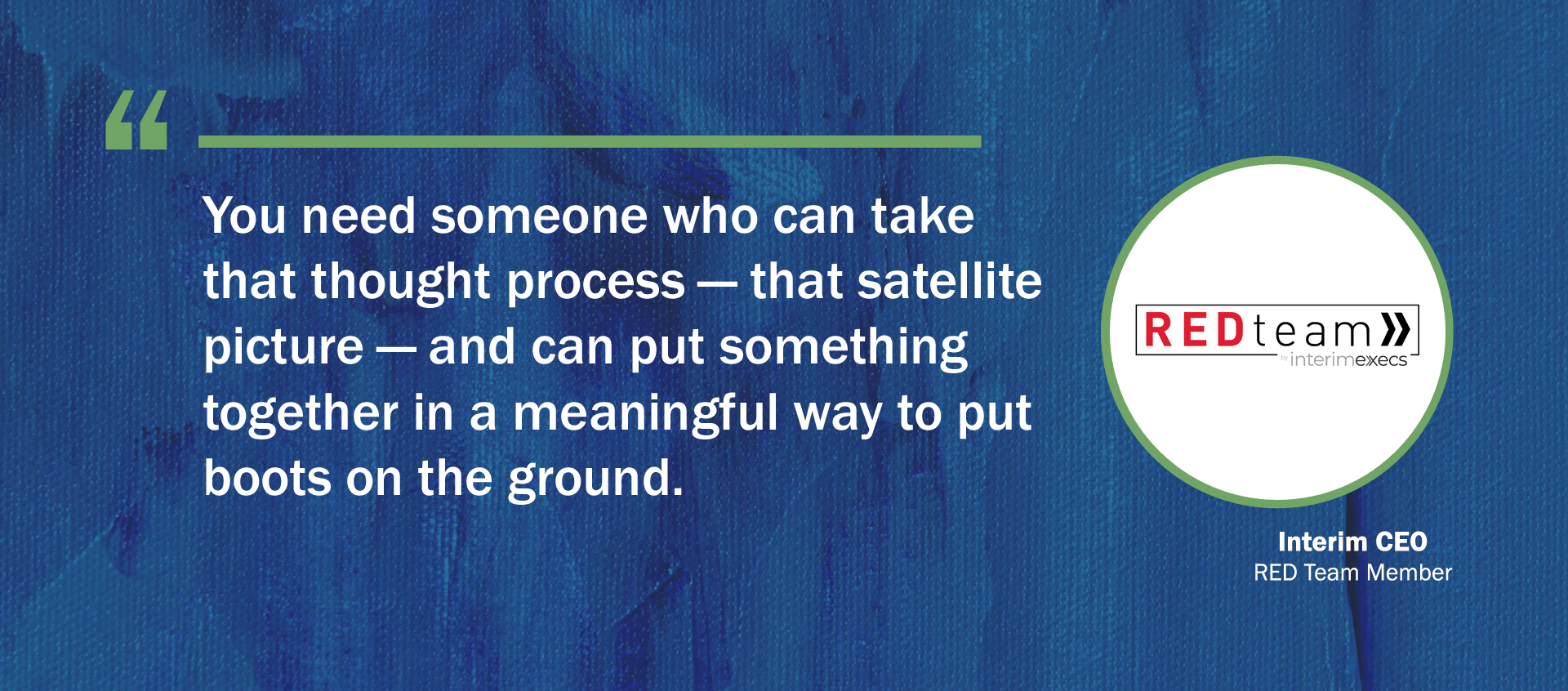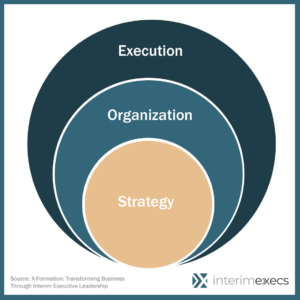What’s the Difference Between an Interim Executive and a Consultant?

Your Complete Guide to Interim Management — Chapter 4: The Difference Between Interim & Consulting
04: What’s the Difference Between an Interim Executive and a Consultant?
There is some overlap and one distinct difference between an interim executive and a management consultant. Let’s dive into the details.
First, the areas of overlap. Both consultants and senior-level interim executives:
• are outside experts brought in for a short period of time,
• provide expert advice,
• analyze existing organizational problems, and
• develop plans for improvement.
And now, the big difference: The interim executive will stick around to implement those plans.
Unlike a consulting firm that will hand you the plan and move on to their next assignment, the interim executive has skin in the game. A skilled operator with a track record of success, the interim executive will become a critical part of the management team, staying on the job for weeks, months, or even years, to see that the plan becomes reality.
Interim executives blend the skills of a seasoned executive with approaches often used by consultants. They drive strategy, develop plans, and lead the execution of major transformational initiatives while serving as mentors and coaches to those around them. And, they are ultimately accountable to the organization for the results they deliver.
Execution
An important distinction between interims and traditional consultants is the expectation of execution. As this UPS commercial mocking consultants says, “We don’t actually do what we propose, we just propose it.” Interims may propose but always do.
A hallmark of experienced interims is the ability to solve challenges and present practical approaches based on their real-world experience solving similar problems for other companies. Interims develop strategies knowing that they will be leading the execution and be accountable for the results. The resulting action plan tends to be more grounded and robust than those developed by professionals who are not charged with execution.
Interims exhibit a bias towards action, focusing on speed over study. They have grown and built companies, led P&Ls, and understand the responsibility for making sure employees and vendors get paid now. While studies can provide valuable data to confirm key assumptions and understand complex situations, they can take extended periods of time.
Interims are charged with accomplishing much very quickly, as delay often exacerbates the issues being addressed, with a popular quote being “act quickly because most things are obvious.”

The Complete Guide to Interim Management
-
- 01 What is an Interim Executive?
- 02 When is an Interim Manager the Right Choice?
- 03 When an Interim Executive is Not a Good Option
- 04 What’s the Difference Between an Interim Executive and a Consultant?
- 05 How do Interim Execs Approach Assignments?
- 06 Interim Executive Recruitment: Making the Right Match
- 07 The Process for Engaging an Interim Executive
- 08 How to Prepare Your Company for an Interim Leader

Leadership
Interims lead organizations from within, employing many tools and approaches used by high-end consultants, but with direct authority over employees. The act, and expectation, of direct leadership and decision-making is a clear differentiator between a consultant and an Interim.
While many consultants are seasoned executives, interims always are. In addition to the skills of a consultant, interims bring considerable additional attributes including leadership, management, governance, decision-making, and a much wider, full organizational view of needs.
As the accompanying diagram shows, interims cover the entire domain while consultants often focus only on the inner gold (strategy) domain.
Accountability
Interims, by definition, are executive-level leaders in an organization for a non-permanent duration. As such, interims are accountable to the organization to deliver results. This key difference between consultants and interims should always be top-of-mind for organizations considering the specific help they need to address challenges and opportunities.
Interims create accountability by practicing leadership and management, holding others accountable to them and to the organization. Seasoned interims know that their success will be limited by dysfunction and, as a result, hold others at all levels accountable for their commitments and end results. That level of accountability shines a bright light on the value each person contributes to the company, causing under-performing individuals who are not up to the challenge to seek employment elsewhere.
Continue Reading: Chapter 5 – How do Interim Execs Approach Assignments?

FREE DOWNLOAD
Top Trends Driving the Growth of Interim Management
▶ Introduction
▶ 1: What is an Interim Executive?
▶ 2: When is an Interim Manager the Right Choice?
▶ 3. When an Interim Executive is Not a Good Option
▶ 4: What’s the Difference Between an Interim and a Consultant?

